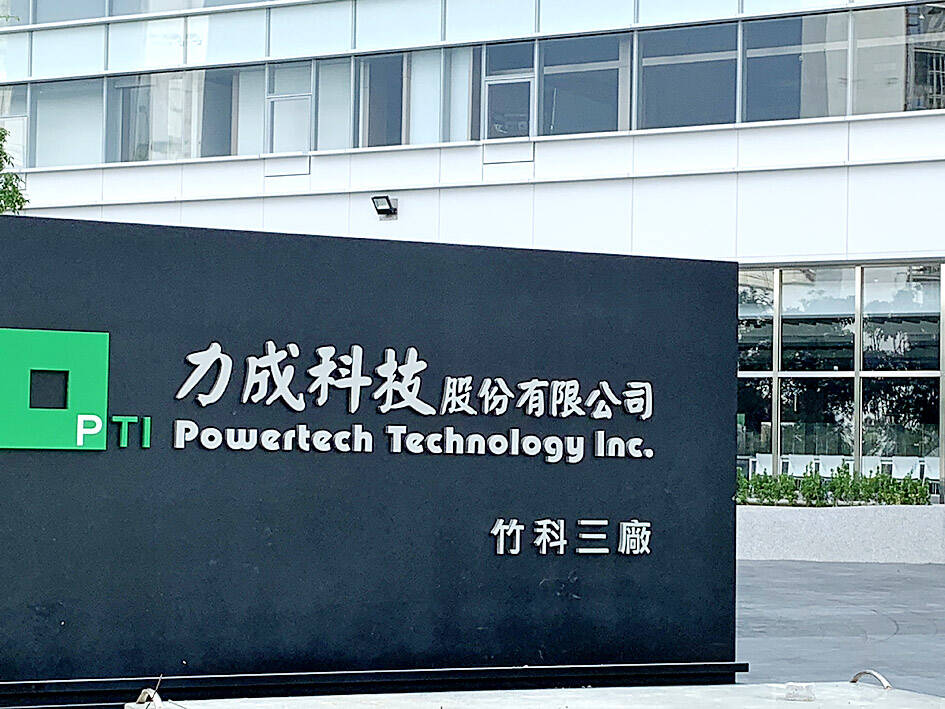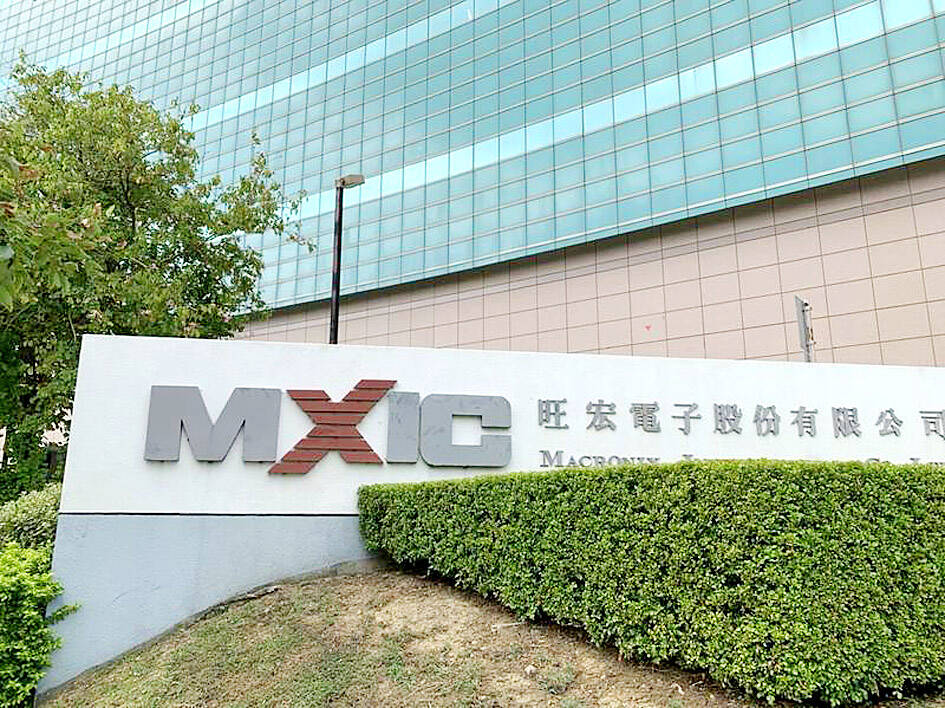Powertech Technology Inc (PTI, 力成), which provides packaging and testing services for memorychip makers, yesterday reported record quarterly profits, bolstered by asset disposal gains and a better product portfolio.
Net profit last quarter more than doubled to NT$3.97 billion (US$127.4 million) from NT$1.57 billion in the third quarter and compared with NT$1.35 billion a year earlier.
Earnings per share (EPS) were NT$5.31 last quarter, up from NT$2.1 the previous quarter and NT$1.81 a year ago.

Photo: Grace Hung, Taipei Times
Non-operating income soared to NT$2.9 billion from NT$574 million in the prior quarter, mainly due to gains of NT$1.43 billion from disposal of a Chinese fab.
For the whole of last year, PTI’s net profit shrank 7.8 percent to NT$8 billion from NT$8.69 billion in 2022, as the semiconductor industry experienced a tough year.
EPS dropped to NT$10.72 from NT$11.6 in 2022 and gross margin fell to 17.9 percent from 20.7 percent the previous year.

Photo: Grace Hung, Taipei Times
The Hsinchu-based company holds a conservative view about prospects in the first half of this year, but expects a robust pickup in the second half, it said.
PTI forecasts a single-digit percentage growth in revenue this quarter on an annual basis, supported by customers’ rush orders, company CEO Boris Hsieh (謝永達) told an investors’ conference.
“The first quarter is usually a slack season for PCs, mobile phones and consumer electronics. Nonetheless, we still received a large volume of rush orders,” Hsieh said. “Nowadays, customers tend to place orders only three months ahead, shrinking from nine to 12 months before, as they do not want to overbuild inventory.”
PTI expects to see “pronounced” growth next quarter, as corporations increase investment in servers, Hsieh said.
During the third and fourth quarters, demand for artificial intelligence (AI)-enabled servers, PCs, mobile phones and other AI-related applications would stimulate the memorychip business, he said.
The company is expected to ramp up advanced packaging for high-bandwidth-memory (HBM) chips in the final quarter of this year at the earliest, Hsieh said.
“We are the world’s only outsourced-semiconductor-assembly-and-test that is capable of providing such advanced packaging service for HBM,” PTI chairman Tsai Du-kung (蔡篤恭) said.
To address rising demand, PTI plans to spend NT$10 billion on capital expansion this year, up about 30 percent from more than NT$7 billion last year.
Separately, Macronix International Co (旺宏), the world’s biggest NOR flash chipmaker, yesterday reported a loss of NT$1 billion for last quarter, the worst in about eight years, compared with NT$408 million the previous quarter.
Gross margin plunged to the lowest level in more than seven years to 19 percent last quarter.
That led the chipmaker to report a loss of NT$1.7 billion last year, reversing a profit of NT$8.97 billion in 2022. That translated into losses per share of NT$0.92 last year, versus earnings per share of NT$4.85 the year before.
Last year, significant inventory impairment and costs for idled capacity added to already sluggish customer demand, Macronix said.
While predicting that the worst has passed, the company said recovery would be fragile this year as auto companies are still grappling with inventory correction.
“The first quarter will not be a good quarter. Demand has yet to take off,” Macronix president C. Y. Lu (盧志遠) told investors. “It all depends on how fast the excess inventory can be digested.”
The inventory of NOR flash memory is the highest among the company’s major products, followed by ROM and then NAND flash memory chips, he said.

The DBS Foundation yesterday announced the launch of two flagship programs, “Silver Motion” and “Happier Caregiver, Healthier Seniors,” in partnership with CCILU Ltd, Hondao Senior Citizens’ Welfare Foundation and the Garden of Hope Foundation to help Taiwan face the challenges of a rapidly aging population. The foundation said it would invest S$4.91 million (US$3.8 million) over three years to foster inclusion and resilience in an aging society. “Aging may bring challenges, but it also brings opportunities. With many Asian markets rapidly becoming super-aged, the DBS Foundation is working with a regional ecosystem of like-minded partners across the private, public and people sectors

Taiwan Semiconductor Manufacturing Co (TSMC, 台積電) has secured three construction permits for its plan to build a state-of-the-art A14 wafer fab in Taichung, and is likely to start construction soon, the Central Taiwan Science Park Bureau said yesterday. Speaking with CNA, Wang Chun-chieh (王俊傑), deputy director general of the science park bureau, said the world’s largest contract chipmaker has received three construction permits — one to build a fab to roll out sophisticated chips, another to build a central utility plant to provide water and electricity for the facility and the other to build three office buildings. With the three permits, TSMC

BREAKTHROUGH TECH: Powertech expects its fan-out PLP system to become mainstream, saying it can offer three-times greater production throughput Chip packaging service provider Powertech Technology Inc (力成科技) plans to more than double its capital expenditures next year to more than NT$40 billion (US$1.31 billion) as demand for its new panel-level packaging (PLP) technology, primarily used in chips for artificial intelligence (AI) applications, has greatly exceeded what it can supply. A significant portion of the budget, about US$1 billion, would be earmarked for fan-out PLP technology, Powertech told investors yesterday. Its heavy investment in fan-out PLP technology over the past 10 years is expected to bear fruit in 2027 after the technology enters volume production, it said, adding that the tech would

YEAR-END BOOST: The holiday shopping season in the US and Europe, combined with rising demand for AI applications, is expected to drive exports to a new high, the NDC said Taiwan’s business climate monitor improved last month, transitioning from steady growth for the first time in five months, as robust global demand for artificial intelligence (AI) products and new iPhone shipments boosted exports and corporate sales, the National Development Council (NDC) said yesterday. The council uses a five-color system to measure the nation’s economic state, with “green” indicating steady growth, “red” suggesting a boom and “blue” reflecting a recession. “Yellow-red” and “yellow-blue” suggest a transition to a stronger or weaker condition. The total score of the monitor’s composite index rose to 35 points from a revised 31 in August, ending a four-month